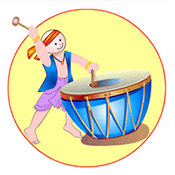
Dimdima
Online Children's Magazine from India

Dimdima
Online Children's Magazine from India

Mere mention of the word 'India' signifies a place of cultural heritage as well as diversity. We the people of India are standing at a point where we can see both the west and the east. But the cultural legacy that we are showing to the whole world is becoming a thing of history in metropolitan cities.
On one side we enjoy our so-called rich culture and really admire it but on the other side we find discotheques full of young guys and girls.
Secondly, Joint family tradition, one of the biggest assets of India is now vanishing under the shadow of the so called western culture. Nuclear families are taking place of many years' old values. Youth of today is more interested in their privacy rather than enjoying their lives with others. As many as 80 per cent of drug addicts between the age group of 15-24 years belong to nuclear families and out of that majority are those whose both parents are working. It was revealed by a survey conducted by the Red Cross Drug Deaddiction-cum-Rehabilitation Center. Individualization has broken up the joint family system, paving way for the youth to fall prey to drug addiction. This stage is the most vulnerable period of life where the youth need guidance, counseling, education and care by parents.
So what we are doing today is, acquiring all the things that directly or indirectly are hitting our value system but ignoring the virtuous values with which we can enhance the over all look and personality of the individual and also our nation. First and the foremost thing that we are lacking today is the respect of time. Punctuality is the last entity that one wants to follow and every one knows the consequences of it. If you do not respect time, it won't respect you either.
Then comes the term cleanliness. Majority of the Indians have no such word in their dictionaries. They spit wherever they want. They are not at all bothered about their surroundings. One can easily see the litter beside a bin provided for it. This leads to unhealthy surroundings as it emanates poisonous gases in the environment.
Leaving the punctuality and cleanliness behind, another front that needs attention is the child labour and illiteracy. Coming generation is burdened under the workload and earning before stepping into the adulthood. But they generally belong to the lower strata of the society. With little opportunity of education and an apparently endless cycle of grinding poverty stretched out before them, most poor children have few alternatives but to contribute to the family's economic. According to UNICEF, India has more illiterate people than any other country. Census figures for 1991 show 320 million, or about one-third of the population, cannot read or write. These poor people play a major role in increasing the population of India as they think that giving birth to number of children will increase their bread earning hands. But their children are forced to work in different odd jobs and that is further aggravating the problem. The problem of child labour, illiteracy and over population
are so badly interwoven that it is creating an endless cycle of uncertainty.
Then comes the status of women in India. Although it has improved a lot but still there should be a special focus on advancing women's economic, social and cultural rights. Today's woman is advancing in every sphere of life but there still exists some loopholes in her life. Statistically speaking, India still remains a very traditional country. Statistics show that there is still a very high preference for a male child in states like Uttar Pradesh, Maharashtra, Madhya Pradesh, Punjab etc. The male to female ratio in these states shows that the percentage of males to females is higher. According to a recent report by the United Nations Children's Fund (UNICEF) up to 50 million girls and women are missing from India' s population as a result of systematic gender discrimination. Every now and then there is news of female feticide. There is also the problem of bride burning, eve-teasing, social discrimination etc.
Then there is 'corruption', which has acquired a shape of monster these days and is deeply embedded in our society. It will take a long time to combat these problems but working on right lines can improve the condition.
One thing is that we should stop blaming others as we all are blessed with the sense of understanding. We can judge what is right or wrong. So follow the right path, cause right things and let the right things happen to you.
By: Ramandeep Kaur
KIRAN
Great !!! I think the author has discussed the problems concerning India and we should work to eradicate these.
SONU
Why cannot our politicians understand this? They keep on fighting with each our for power, keeping all these matters aside.
PARRY
Whenever we talk about east and west we start comparing them. What I think is that the two are entirely different. Our culture is very rich in term of family values and respect for elders, all the family members are bound in close threads.
NAMRATA
I think that when we talk about east and west we start comparing them and try to follow them but in reality nobody knows what is western culture in the true sense and what is it's meaning.
PRANESH MISHRA
Marvellous, I think of you as a great thinker towards maintaining the sacrament of Indian culture
SWAROOPAJONAH
Now adays in this busy life we people do not have time to bond a tie to our relationships. It's better to stay in joint family rather than a nuclear one.
EXPLORE MORE...
Dimdima is the Sanskrit word for ‘drumbeat’. In olden days, victory in battle was heralded by the beat of drums or any important news to be conveyed to the people used to be accompanied with drumbeats.
Bharatiya Vidya Bhavan
K. M Munshi Marg,
Chowpatty, Mumbai - 400 007
email : editor@dimdima.com
Bharatiya Vidya Bhavan
505, Sane Guruji Marg,
Tardeo, Mumbai - 400 034
email : promo@dimdima.com
Dimdima.com, the Children's Website of Bharatiya Vidya Bhavan launched in 2000 and came out with a Printed version of Dimdima Magazine in 2004. At present the Printed Version have more than 35,000 subscribers from India and Abroad.